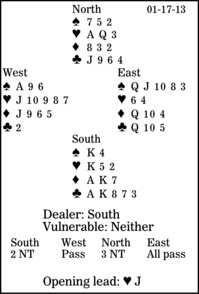Bridge column, January 17: Keep from swerving and crashing

You can't take a crash course to be an expert declarer in bridge. However, here is a chance to dance around a three-no-trump deal. What should South do after West leads the heart jack?
Despite having only 20 high-card points, South's hand is nearly strong enough to open two clubs and rebid two no-trump. All those aces and kings, along with the good five-card suit, make that hand worth some 22 points. (A two-no-trump opening typically contains either three aces and one king or two aces and three kings. As this hand has two aces and four kings, it is over average.)
South starts with seven top tricks: three hearts, two diamonds and two clubs. Most days, he will get three more winners from clubs for an overtrick. But it would be a good idea to sacrifice the potential extra trick to avoid crashing like the original declarer. He won the first trick and immediately took his two top clubs. When the queen did not drop, South continued with a third club. Now East did well, shifting to the spade queen. Whatever declarer did, he had to lose five spade tricks and go down two.
Since the contract is in danger of crashing only if East gains the lead, South should have taken the first trick on the board and played a low club to his eight (assuming East followed suit with the two or five, of course). Even if it lost to the 10, the suit would then have run and the contract come home safely.
** ** **
COPYRIGHT: 2013, UNITED FEATURE SYNDICATE
DISTRIBUTED BY UNIVERSAL UCLICK FOR UFS

